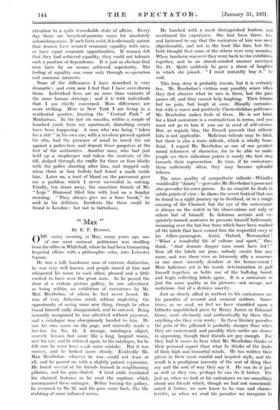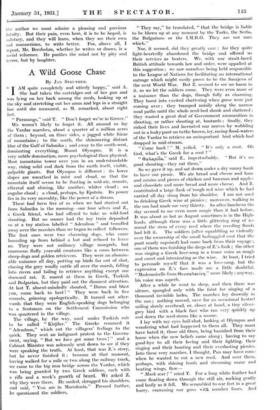" Max
By E. F. BENSON.
ONE sunny morning :rn May, many years ago, one of our most eminent politicians was strolling from the office in Whitehall, where he had been transacting Imperial affairs with a philosophic calm, into Leicester Square.
He was a tall, handsome man of extreme distinction, he was very well known, and people stared at him and whispered his name to each other, pleased and a little excited to have seen the great man. As he passed the door of a certain picture gallery, he saw advertised, as being within, an exhibition of caricatures by Mr. Max Beerbohm, of whom he had never heard. He was of very Athenian mind, seldom neglecting the opportunity of seeing some new thing, though he often found himself sadly disappointed, and he entered. Being instantly recognized he was admitted without payment, and a catalogue was obsequiously handed to him. He saw his own name on the page, and naturally made a bee-line for No. 21. A strange, misshapen object, scarcely human but more like a long, languid worm, met his eye, and he referred again to his catalogue, for he felt sure he must have 1.de some mistake. But it was correct, and he looked more closely. Evidently Mr.
Max Beerbohm—whoever he was-could not draw at all, and he passed on with a slightly pained expression. He found several of his friends framed in neighbouring pillories, and his pain abated. A faint smile irradiated his claSsical features as he read the captions which accompanied these outrages. Before leaVing the gallery, he returned to No 21, and his pain came back, like the stabbing of some inflamed nerve. He lunched with a most distinguished hostess, and mentioned his experience. She had been there, 'too, and hastened to say that the caricature of him was most objectionable, and not in the least like him, but they -both thought that some of the others were very amusing. When luncheon was over they went back to the exhibition together, and in an absent-minded manner surveyed No. 21. Quite suddenly he gave a shout of laughter in which she joined. " I must instantly buy it," he said.
This long story is probably trovato, but it is certainly ben. Mr. Beerbohm's victims may possibly wince when they first observe what he sees in them, but the pain passes off, and they cannot help laughing. Their friends feel no pain, but laugh at once. Blandly corrosive, but with a suave and positively Chesterfieldian politeness Mr. Beerbohm makes fools of them. He is not kind, for a kind caricature is a contradiction in terms, and you must not go to him if you are in need of self-esteem. But, as regards him, the French proverb that ridicule kills is not applicable. Malicious ridicule may be fatal, but there is also a tonic ridicule, which is wholly bene- ficial. I regard Mr. Beerbohm as one of our greatest moral reformers of character, for to be able to make people see their ridiculous points is surely the first step towards their regeneration. In time, if he caricatures them sufficiently often, they may become splendid fellows.
The same quality of sympathetic ridicule—Whistler would call it "dainty"—pervades Mr. Beerbohm's prose and also pervades his rarer poems. As an essayist he deals in subtle points of view : he shows the secret festival that can be found in a night journey up to Scotland, or in a rough crossing of the Channel, but the eye of the caricaturist is always on the watch in his observations not only, of others but of himself. In dolorous accents and ex- quisitely-turned sentences he presents himself ludicrously mourning over the hat-box from which have been washed all the labels that have earned him the respectful envy of his fellow-passengers. Assisi, Oxford, Newmarket ! " What a wonderful life of culture and sport," they think, " that demure dapper man must have led ! " Now all the labels are gone, nobody envies him any more, and was there ever so fatuously silly a mourner or one more sincerely desolate at his bereavement ? More ludicrous yet is his manly determination to pull himself together, as befits one of the bull-dog breed, and begin collecting labels again. It is a caricature of just the same quality as his pictures—not savage, not malicious—but of a derisive suavity.
Just as closely allied in method to his caricatures arc his parodies of revered and eminent authors. Some- times, as we read, we feel we have stumbled upon a hitherto unpublished piece by Henry James or Edmund Gosse, more obviously and authentically by them than anything else they ever wrote. In these literary parodies the pain of the pilloried is probably sharper than when they are caricatured, and possibly their smiles are slower in appearing, though their friends are gay enough. For they find it easier to bear what Mr. Beerbohm thinks of their personal aspect than what he thinks of the fruits of their high and immortal minds. He has written their pieces in their most careful and inspired style, and the result is a prodigious travesty of the sort of thing they say and the sort of way they say it. -He can do it just as well as they can,' perhaps he can do it better. For just as, when we look at his caricatures we see something about our friends which, though we had not consciously noted it before, we now know to be true and• charac- teristic, so when we read his parodies we recognize in the author we most admire a pleasing and precious fatuity. But their pain, even here, it is to be hoped, is salutary, and they will learn, when they see their own sad mannerisms, to write better. For, above all, I repeat, Mr. Beerbohm, whether he writes or draws, is a social reformer. He purifies the mind not by pity and terror, but by laughter.







































 Previous page
Previous page